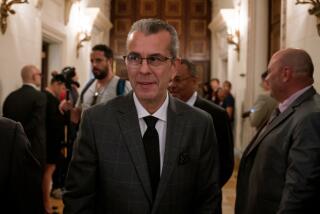Haitian Vote Was Aboveboard, Aristide Says
- Share via
PORT-AU-PRINCE, Haiti — President Jean-Bertrand Aristide said Tuesday that while he regretted problems with Haiti’s parliamentary and municipal elections, there was no fraud and the vote was “a major step toward democracy.”
Speaking against a background of continuing complaints about electoral irregularities and mismanagement, Aristide told American reporters in his office that the major accomplishment of Sunday’s elections was their largely peaceful nature.
“Last Sunday,” he said in a quiet voice, “I saw the Haitian people [vote] in a peaceful climate. . . . They were delighted to have that opportunity to show the will of the Haitian people.”
The relative lack of violence, Aristide said, “feeds my faith in my people.”
He was interviewed before reports surfaced of what could be the first instance of serious election-related violence here, the alleged killing of an opposition candidate. Port-au-Prince Mayor Evans Paul said in a statement that Henock Jean-Charles was shot to death Tuesday in the southwest city of Anse d’Hainault by a rival candidate for mayor.
Paul and Jean-Charles belong to the National Front for Change and Democracy, which split earlier from Aristide and has run candidates opposing the president’s party, the Lavalas Political Organization.
United Nations and Organization of American States officials said “it is probable” the killing occurred, but they said they had not seen the victim’s body or confirmed that the killing was political.
When asked about the instances of closed polling stations, missing ballots and charges of improper vote counting, Aristide called the problems “technical aspects . . . which we regret.”
He said he will meet soon with leaders of various political parties to discuss “how to repair these problems.” He said he has urged the country’s Provisional Electoral Council to seek solutions in time for parliamentary runoff elections on July 23 as well as for the presidential vote scheduled for December.
As if aware of criticism that he had stacked the deck against disorganized and poorly financed opposition parties, the president said that “if necessary,” he will order his government to consider giving them “financial support.”
He blamed Haiti’s lack of a tradition of and experience with democracy for some of the problems, saying that electoral workers “will have to improve. The country will have to improve.”
At the same time, Aristide indicated that the responsibility for the crippled process has to be shared by parties and candidates unable to accept losing.
“I don’t see that” there was any fraud, Aristide said. But “I did see a fraudulent society. For instance, people who felt they would lose would burn ballots.”
Haitian politicians must learn to lose and to act “within legal means. . . . To lose an election is not to lose a country,” he said.
Aristide repeated that under no circumstance will he try to extend his term, which expires Feb. 7; nor, he said, will he seek or accept changes in the constitutional prohibition against his succeeding himself.
More to Read
Sign up for Essential California
The most important California stories and recommendations in your inbox every morning.
You may occasionally receive promotional content from the Los Angeles Times.










